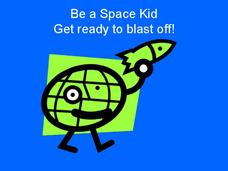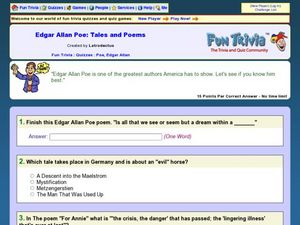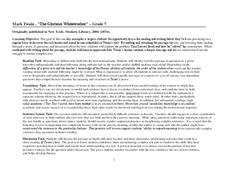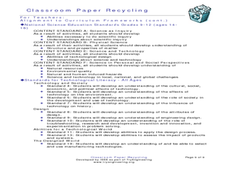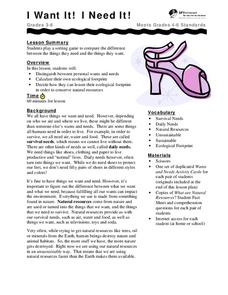Curated OER
Space Kids...Get Ready to Blast Off!
Be a space kid and learn about the moon. This simplistic presentation provides basic information on the location and surface of the moon, and appears to be learner generated. Tip: Have your class learn about the climate and surface of...
Curated OER
Writing an Effective Resume
Rating prospective teacher candidates based on sample resumes opens this discussion of effective business communication. After generating a list of interview candidates based on their resumes, pupils justify their choices. A study of...
Curated OER
Edgar Allan Poe: Tales and Poems
While the mechanical errors present in this quiz render it useless as is, you may find it helpful in generating your own questions on various Edgar Allan Poe stories and poems.
Curated OER
"Hamlet" Do you know the text?: Fun Trivia Quiz
While this short quiz is not well designed, it may be useful for generating your own reading comprehension questions on William Shakespeare's Hamlet.
Curated OER
The Glorious Whitewasher
Young readers can be exposed to the literary works of Mark Twain as they interact with challenging text and gain experience by reading the complex passages of chapter two "The Glorious Whitewasher" from his famous book, The Adventures of...
Institute of Electrical and Electronics Engineers
Get Connected with Ohm's Law
Ideal for your electricity unit, especially with middle schoolers, this lesson plan gets engineers using multimeters in electrical circuits to explore the relationships among voltage, current, and resistance. Older learners may even plot...
Institute of Electrical and Electronics Engineers
Classroom Paper Recycling
After reading about the history and recycling of paper, creative crafters collaborate to think of a new process for making recycled paper. A complete teacher's guide and student worksheets are included. There is no written procedure for...
Institute of Electrical and Electronics Engineers
Ship the Chip
Here is a tasty challenge, especially for middle school engineers: design a container that meets mass and volume criteria, and will safely transport a tortilla or potato chip through the mail without damaging it! Mostly, this is a crisp...
City and County of San Francisco
I Want It! I Need It!
Discuss wants and needs with your elementary ecologists and get them to consider what would happen to our natural resources if we all got everything that we want. Learners play a card sorting game and take an ecological footprint quiz on...
Howard Hughes Medical Institute
The Making of the Fittest: The Birth and Death of Genes
After watching an engaging 13-minute video about the colorless blood of icefish, future ichthyologists examine icefish blood and non-icefish blood (blood samples are simulated with Karo syrup mixtures) to determine advantages of...
Baylor College
Food Webs
Explore various ecosystems from around the world as your class discovers the interdependence of all living things. Using the provided sets of ecosystem cards, young scientists work in small groups building food webs to demonstrate the...
Baylor College
Using Heat from the Sun
Let's heat things up! This simple experiment demonstrates for learners the important role the sun plays in providing the earth with energy. Place one cup of water in direct sunlight and one in shade, then take measurements in order to...
Baylor College
Rainbow in the Room
Uncover the science behind the beautiful phenomena of rainbows with a simple demonstration. Shine light through different-sized containers of water as young scientists learn that rainbows occur when visible light is split up into its...
Baylor College
Modeling Earth's Atmosphere
Life on Earth is made possible by the unique composition of its atmosphere. Working collaboratively, a scale model is created as young scientists learn about the different layers of gas that surround the planet. Cards are included that...
California Academy of Science
Kinesthetic Astronomy: Earth's Rotation
After completing the activity, "Kinesthetic Astronomy: The Meaning of a Year," zoom in on Earth's rotation using the same simulation setup and this outline. Each class member dons a map of the Western Hemisphere and plays the part of...
California Academy of Science
Kinesthetic Astronomy: The Meaning of a Year
How many times have you traveled around the sun? Aspiring astronomers grasp what a year is and they differentiate between orbit and rotation by walking around the sun right within your classroom. Place a lamp in the center of the room to...
California Academy of Science
Kinesthetic Astronomy: Moon Phases
We are the world! Each of your class members models Earth and holds a styrofoam ball to see its phases. Thorough teacher background information and a detailed lesson plan will make this a cinch to teach. If you do not want to purchase...
California Academy of Science
Kinesthetic Astronomy: Mars Opposition Dance
Your class will watch as one child orbits the sun as Earth, while another orbits as Mars. If the timing is right, they will see the repetitive dance between the two planets and discover how often they are opposite from each other. For...
Scholastic
Study Jams! Sound
Listen in as Mia and Sam expound on sound. It is caused by vibrations and travels in waves. It has the qualities of pitch, frequency, and volume. This hip animation displays a graph to depict the frequency and amplitude of sound waves....
Baylor College
What Is the Water Cycle?
Small groups place sand and ice in a covered box, place the box in the sunlight, then observe as evaporation, condensation, and precipitation occur. These models serve as miniature water cycles and demonstrations of the three phases of...
Baylor College
Can Nutrients in Water Cause Harm?
Ecology candidates culture pond water organisms over a few days time, then they experiment to find out how increasing nutrients affects the population. As part of a unit on water, this exploration gives your class an understanding of how...
Howard Hughes Medical Institute
How Novel Icefish Genes Can Improve Human Health
Designed to accompany the 13-minute video The Making of the Fittest: The Birth and Death of Genes, this handout serves as both a viewing guide during the video and an analysis of how the adaptations of the icefish might help treat some...
Institute of Electrical and Electronics Engineers
Toxic Popcorn Design Challenge
Engineering enthusiasts are sure to explode in understanding as they practice the engineering design process (EDP). A container of "toxic popcorn" is placed in the classroom. Teams must work together to devise a method for removing it...
Institute of Electrical and Electronics Engineers
Exploring at the Nanoscale
Nano-nano! Nanotechnology can seem like it's from another planet! After learning about this tiny technology, collaborative groups experiment with how smaller particles affect chemical reactions. They do this by immersing a whole and a...
Other popular searches
- Van De Graaff Generator
- Electric Generator
- Online Poem Generator
- Parts Speech Generator
- Earthquake Generator
- Random Number Generators
- Van De Graff Generator
- Static Electricity Generator
- On Line Poem Generator
- Story Generators
- Van De Griff Generator
- Batteries Generators


